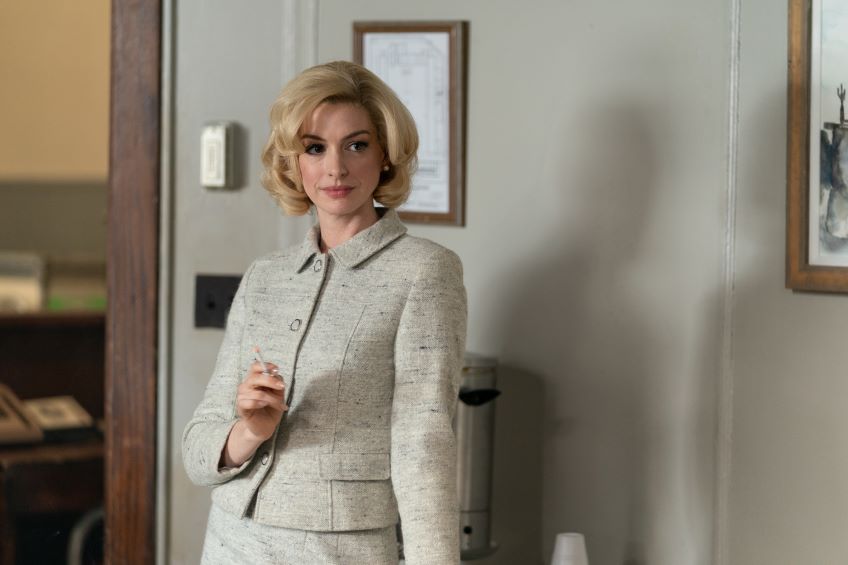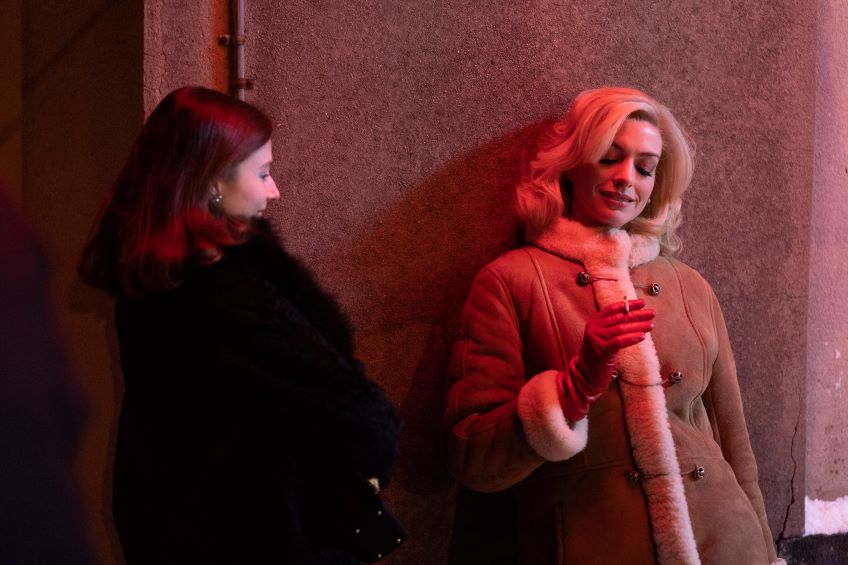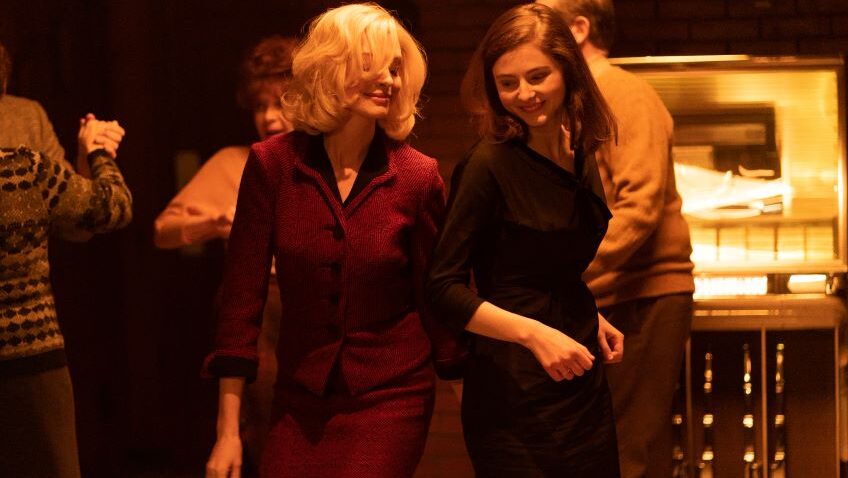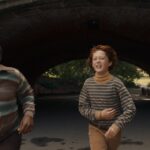Joyce Glasser reviews Eileen (December 1, 2023), Cert 15, 98 mins.
There are bitter cold winter nights when you want to crawl into a psychological thriller like Eileen – or what Eileen could have been if it had a better third act. Based on the book by Ottessa Moshfegh, this is director William Oldroyd’s hotly anticipated follow- up to Lady Macbeth, the excellent film that also launched the career of Florence Pugh. The film is set in a bitter cold winter in a rundown Boston neighbourhood in 1964, when Lyndon Johnson won a landslide victory and signed the Civil Rights Act, and the Boston Strangler, Albert DeSalvo, is finally captured. But sexual predators come in all forms, and one might even be the love of your life.
Eileen (Thomasin McKenzie), a thin, pale woman in her early twenties with mousey brown hair and a forgettable face, sits in her car on a rainy night, facing the beach. She watches a couple making love in their car before stuffing a handful of snow down her trousers. When she arrives home you can see why she stays out as much as possible. The ramshackle, uninviting house is dark and colourless, and sitting in the dark is her father.
Eileen cannot avoid her widowed father (Shea Whigham), an ex-cop with a case of paranoia who sits by the door in an arm chair drinking and dozing off. He is known to go outside with a gun he shouldn’t have to terrify the neighbours when he’s had too much.
Eileen cannot afford to live on her own and over the years, her self-esteem has suffered from his verbal abuse. He goads her that she will never leave like her older sister, who has her own home and is married, the older sister he never hears from. Prone to day dreaming to escape reality, Eileen imagines killing her father and herself.

Perhaps that is what attracts her to the handsome new inmate Lee Polk (Sam Nivola) who is charged with stabbing his father to death. Work at a corrections facility for teenage boys is hardly a respite from home, although Eileen can escape her bullying female colleagues by fantasising about one of the guards.
All that changes though, when the facility hires a Harvard psychology PhD, to work with the young men who are deemed young enough to turn their lives around. Like Eileen, the new doctor, Rebecca (Anne Hathaway, Les Misérables, The Devil Wears Prada), takes what turns out to be an unhealthy interest in Polk, or rather in his mother Rita (Marin Ireland) who Rebecca suspects holds the key to her son’s actions.
When Eileen first sees the poised and glamorous new prison psychologist being introduced to the staff and feted by the proud prison director, she is taking out a rubbish bag that splits open, soiling her clothing. This is the moment of rock bottom and then Rebecca looks at Eileen, seeing past her drab clothing and withdrawn face, or deep into it.
Over the next twenty-minutes or so the two women get to know one another, although it’s obvious the relationship is unbalanced. Rebecca knows the effect she has on Eileen and teases her into relaxing. When Rebecca surprises Eileen in the records office searching for Lee Polk’s records, Rebecca flirts with her, holding out a cigarette that non-smoker Eileen accepts, coughing heavily.
‘It’s a nasty habit,’ Rebecca cautions her. ‘Coffee and cigarettes make my teeth yellow’ she continues, flashing a wide smile of sparking teeth. Then, they have a kind of date in a crowded pub.
Eileen has never met anyone like Rebecca before. Independent, stylish, beautiful, well-educated and a taboo-busting free spirit. Rebecca tells Eileen, who asks about a husband, that she’s always been single. ‘When I have a guy around, it’s just for fun,’ she says before asking Eileen to dance.

Two women dancing in the early 1960s attracts the attention of the men in the pub and Eileen, reticent and uncomfortable at first, gains confidence from Rebecca who is absorbed by the music and clearly doesn’t give a toss about the reaction of a bunch of old men. When a younger, single man tries to break in and dance with Rebecca, she pulls Eileen towards her for a slow dance.
Up until this point Eileen is still in awe of this dazzling woman who for some reason takes an interest in her. She dares to hope it is more than a passing interest when, on Christmas Eve, Rebecca invites her over. Excited, and in a joyful mood, Eileen dresses up, and with make up we realise how pretty she is.
The beginning of what can be deemed act three, is so creepy and tense that Oldroyd, working with a script by Luke Goebel and Moshfegh, looks set to surpass the absorbing earlier scenes with a twist that would be a spoiler to describe. But then it all begins to crumble in a scarcely credible climactic scene that leads to a long and not particularly satisfying denouement and conclusion. You understand what the filmmakers are going for, but it does not hold up.
There’s no faulting the performances from the cast, headed by the two talented leads. No one who has seen McKenzie in Jo-Jo Rabbit, The Power of the Dog or Leave No Trace can doubt the actress’s range and versatility. But Hathaway steals the show, playing against type. Playing the sexiest mature Harvard psychology graduate to ever grace our screens, Hathaway laces her seductiveness with malevolence. She takes on Cate Blanchett in Tod Haynes’ Carol, and emerges with something far more disturbing and elusive, a character whose past is of interest to us because of where she has ended up.
The film’s visceral, tense atmosphere, with the escalating Vietnam War far in the background but somehow felt, and the griminess of broken American homes is brilliantly captured by one of the stars of the film, Australian cinematographer Ari Wegner. Wegner first worked with Oldroyd on Lady Macbeth, but since then has exceeded her work there with Peter Strictland’s gorgeously shot, In Fabric, and Jane Campion’s The Power of the Dog for which she became the second woman in the Academy’s 94-year history to be nominated for her cinematography. Here, Wegner uses the camera to complement the hair, make-up and costume department’s work tracking the development of this doomed relationship and project the characters’ psychological states on the screen.




